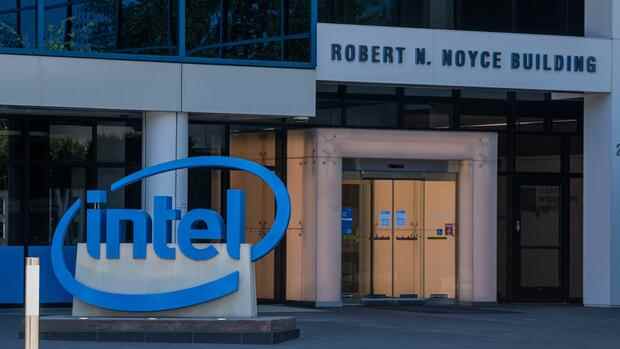One trigger was the decline in revenues in the PC business.
(Photo: Bloomberg)
Santa Clara After a slump in sales and red numbers in the past quarter, Intel conceded its annual targets. The chip giant expects less sales and profits than three months ago. Investors dropped the stock more than 8 percent in after-hours trading on Thursday.
Sales fell in the second quarter of the year, which ended according to Intel’s statement in early July, by 22 percent year-on-year to $15.3 billion. The bottom line was a loss of $454 million after a profit of just over $5 billion a year earlier.
One trigger was the decline in revenue from the PC business by a quarter to $7.7 billion. The division’s operating profit fell even more sharply, by 73 percent to just under a billion dollars. Sales of chips for data centers fell by 16 percent to $4.6 billion – and operating profit melted from just under $2.1 billion to $214 million.
During the corona pandemic, significantly more companies and private individuals ordered PCs in order to be able to work flexibly. However, given the current economic slowdown, high inflation and a return to the office, demand has fallen. The US group generates around half of its sales with semiconductors for desktops and laptops.
Top jobs of the day
Find the best jobs now and
be notified by email.
Intel has therefore lowered its sales forecast for the full year to between $65 billion and $68 billion from the previous $76 billion. That would mean a 13 percent decline at the lower end of the range. Adjusted earnings per share are now also expected to be significantly lower. The figures fell well short of analysts’ expectations.
Intel itself is disappointed with the quarterly results, stressed CEO Pat Gelsinger. “The quarterly results are below the standards that we have set for the company and our shareholders.” He referred primarily to the economic downturn, but also acknowledged problems on the Intel side, including ramping up production of some chips. The Californian company already announced price increases in mid-July.
Gelsinger had initiated a change of strategy at Intel: The group should increasingly produce chips not only for its own range, but also as a contract manufacturer for other companies. The semiconductor giant is thus competing against the heavyweight TSMC, among others.
CFO David Zinsner does not want to let go of the expansion course despite the headwind and stated that he wants to stick to the business strategy. Among other things, the group is investing around 17 billion euros in the construction of two semiconductor plants in Magdeburg, Saxony-Anhalt, and up to 100 billion dollars in a huge production facility in the US state of Ohio. Despite the economic downturn, Zinsner does not anticipate any delays in Ohio construction.
More: Apple defies the economic downturn – especially with strong iPhone sales
